
Prepositions of Time: Hours, Days, Months, Years
Prepositions of time are one of the few cases in English grammar where the rules are rigid and consistent therefore, if you learn these rules once, you’ll never need to worry about them again!
Prepositions of time with days
If you’re new to the English language. It is likely that you have come across prepositions, these are words such as “in,” “on,” “around,” “under,” “over,” which describe where something might be. In addition to where something might be, prepositions can also be used to describe when something may have happened!
For example:
My sister came to visit me on Monday last week.
This first example shows how to use prepositions when we are dealing with days. We use the word “on” to indicate the day something happened. “on Monday,” “on Tuesday,” “on August 23rd,” “on Halloween,” “on my Wedding Day.” As long as you wish to refer to a specific day in history or even in the future, the word “on” will always come before it.
Prepositions of time with hours
If we want to be more specific, we can mention the hour at which something happened. In this case, we use the preposition “at.”
For example:
I have to sleep at 8 pm tonight so that I can wake up early tomorrow.
In this example, the person is using the word “at” to show the specific time at which they want to sleep. “At 6 pm,” “at noon,” “at midnight,” the word at generally plays the same role for hours as on does for days.
Prepositions of time with months
The next timeframe we can refer to is months. If someone were to ask you when your birthday is. There are two ways you could answer this. First, you can reference the day:
My birthday is on the 6th of April.
The second is with reference to the month:
My birthday is in April.
In the second example, we use “in” rather than “on” because we are referring to the month rather than the day.
Prepositions of time with years
Finally, the last timeframe we will look at today is years. Being able to refer to the specific years certain events took place is an important aspect of professional/academic English. There are many cases within a school/university or professional context where you may need to refer to a year that something happened. To do this, you simply use “in.” Eg.
In 1983, my parents emigrated to the US from Spain.
France won the World Cup in 2018.
In 2002, my little sister was born.
To recap:
Days = On
Months = In
Years = In
Prepositions of time are one of the few cases in English grammar where the rules are rigid and consistent therefore, if you learn these rules once, you’ll never need to worry about them again! Good luck!
I am an certified English tutor with over 1000hours worth of lesson experience over the past 3 years. New to LiveXP but not new to teaching!

